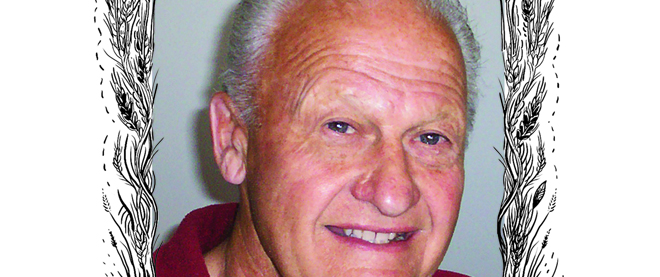Arthur ‘Art’ Armond Mainil
A western farmer, he became a strong opponent of the Canadian wheat board. ‘He wanted free choice,’ his daughter says.
llustration by Juliana Neufeld
Share

Arthur “Art” Armond Mainil was born on Oct. 13, 1933, in Lampman, Sask. He was the oldest of three children for Hector and Emma, a farming couple who settled on the same 960-acre grain and cattle farm that Art’s grandfather homesteaded near the town. Even though he was only a year older than his brother Jerry (his sister Valerie was born six years after him), Art was expected to lead by example in helping to manage the property. At age seven, Art could be seen driving a tractor through fields with his father on a binder behind him.
“Farming was in his blood,” says Jerry, who describes his brother as “strong-headed” even as a child. Along with stubbornness and a solid work ethic, Art developed a lifelong love of horses early on. He had a pinto named Snookie that he rigged up to a cart or sled in order to take his siblings to their one-room school four kilometres from where they lived, after their previous school burned down.
In order for the children to continue to attend school, Art’s family moved to the town of Yellow Grass when he was nine, and then to the town of Weyburn three years later, where they settled (Art’s father made the 45-minute commute to the farm each day). Art was a top student who also played baseball, and was a fast-running centre on his high school football team at Weyburn Collegiate. Four years after graduating from high school, Art decided farming wasn’t for him, and set out to get a higher education. He spent 2½ years pursuing an engineering degree in Denver, Colo., before dropping out and trying his hand as a logger in the bush of northern B.C. After another 2½ years, he returned home to work the land. When Art’s father retired in 1961, he took over the farm, and took great pride in renovating it.
After committing himself to farming as a profession, Art settled into a routine he continued throughout most of his life. He rose before the sun to have a modest breakfast of toast or oatmeal, and worked through the day, stopping only for lunch and to catch the news at noon. On Sundays, Art, who was raised a Catholic, drove to the Benson Sacred Heart church, where he would arrive early enough to say the rosary before mass. It was through the church’s social functions that Art first met Maureen Hogan, who was 21. She shared his values and had moved to Weyburn from Regina to work as a social worker. After dating for two years, the couple married in Regina in 1963, and moved onto a property that was close to Art’s family farm, near the town of Benson. Their first daughter, Kara, was born in 1967 (daughters Patricia, Terry and Stephanie followed).
“He believed you do things right the first time,” says Kara, adding her family often gathered to pray if the crops didn’t look like they were going to thrive. Kara says it was her parents’ strong faith that got them through Terry’s tragic death due to a farming accident the summer before she was to attend Grade 2.
It was also around this time that Art became passionate about fighting the Canadian Wheat Board for the right to sell the grains produced on his farm outside the board’s control. “He wanted free choice, free enterprise,” says Kara. “He did not like the Canadian Wheat Board at all and felt farmers should have choices. He felt they could better market and sell their own products.”
Art was the main force behind the creation of the Weyburn Inland Terminal, which gave farmers more control over the storage and transportation of their product. The independent grain storage terminal opened in 1976, the first farmer-owned-and-operated inland terminal in Canada. In the ’90s, he protested against the board by selling grain to the United States without the organization’s approval, after joining a group called Farmers for Justice.
In 2006, Art was diagnosed with colon cancer. He refused treatment in order to not compromise his ability to work, for however long that might be. Eventually the cancer spread to his liver and lungs, and Art was unable to tend to the farm he loved. In late October this year, he was admitted to St. Joseph’s Hospital of Estevan, where he and Jerry talked about the federal government’s plans to end the control the Canadian Wheat Board has over Prairie wheat. “He was smiling. I think that was the last best day he had,” says Jerry. After a week in hospital, Art returned home. On Nov. 5, he passed away in his bed. “My father died on his farm. That was his dream,” says Kara. Art was 78.